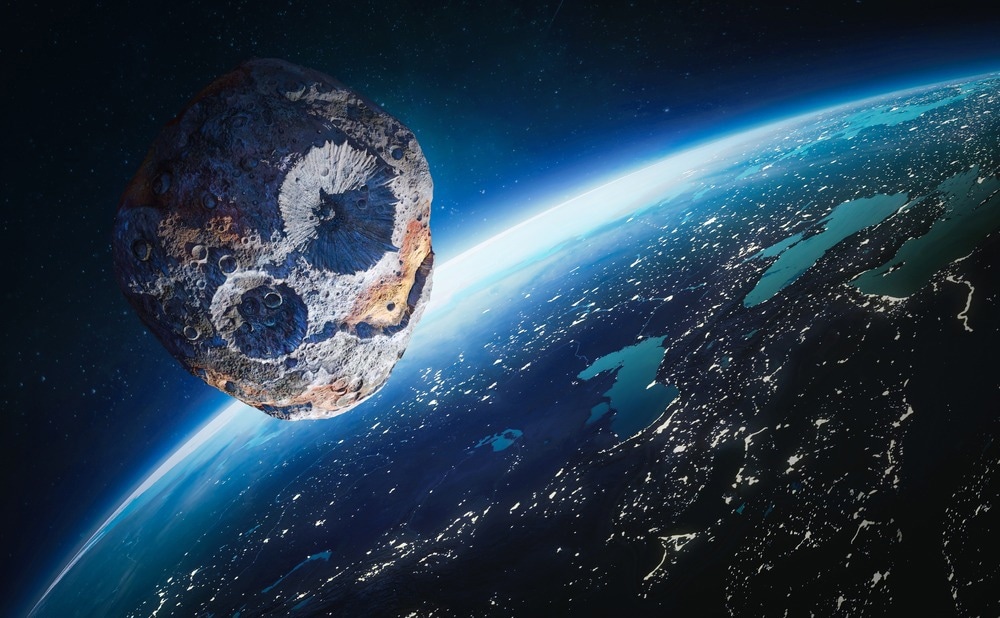The urgent need to switch to renewable energy to save the planet is driving us into space to search for the minerals needed for renewable technology on planets and asteroids. While it may solve our resource problems, researchers have warned that it may damage our solar system. Here, we look at the latest developments in the field and consider how it may evolve to take into account concerns over its sustainability.

Image Credit: Dima Zel/Shutterstock.com
What is Space Mining?
Space mining refers to the “exploration, exploitation and utilization of natural resources to be found in the Moon, other planets and near-Earth asteroids (NEAs)”, according to the Space Generation Advisory Council.
Humans have been mining the Earth for around 40,000 years. While scientists believe the Earth still has much to give in terms of its mineral sources, a recent World Bank Group report warned that the production of minerals, including graphite, lithium, and cobalt, will need to increase by 500% by 2050. This demand increase is driven by the switch to clean energy technologies.
To ensure that we can meet the mineral demands of the growing clean energy sector, scientists have begun looking to space, where astral bodies present a rich source of minerals and metals. While in its early stages of development, space mining is predicted to be a key focus of future space exploration, given its potential to sustain human life by providing the raw materials we need to generate energy.
Commercial mining in outer space may become firmly established in the near future. While it has been theorized about for some years, the first real effort to facilitate asteroid mining occurred in 2012 when Seattle-based aerospace company Planetary Resources launched its venture to expand Earth's resource base. Backed by Hollywood director James Cameron, the company gained much attention and was closely followed by Deep Space Industries, which announced its asteroid mining plans in 2012. Both companies significantly contributed to the emerging field of space mining, with roughly 15,000 asteroids identified as potential mining targets.
Recent Developments in Space Mining
A few years ago, the birth of space mining seemed imminent. Two companies, Planetary Resources and Deep Space Industries, seemed poised to kick off the sector. In 2022, however, both companies were acquired, and neither continued with space mining efforts.
New companies, perhaps most notably AstroForge, have recently emerged with plans to make space mining a reality and succeed where previous companies have failed. AstroForge was founded in 2021 by a team made up of a former SpaceX engineer and a former Virgin Galactic engineer. The young company recently launched the first of two planned missions.
The objective of the first mission is to test the company’s technique for refining platinum from materials obtained on asteroids. The second mission, planned for October 2023, will aim to identify a nearby asteroid suitable for mining.
In total, the mission will take two years. The company plans to target asteroids measuring 20 to 1500 meters in diameter. Rather than landing on them, the plan is to break them apart and gather the desired materials from the rubble. The long-term goal of AstroForge is to reduce the cost of mining metals while reducing the carbon emissions associated with mining on Earth.
Offworld aims to develop mining processes to withstand extreme conditions by integrating artificial intelligence (AI) technology into next-generation robots.
The company recently expanded into Luxembourg to begin its multi-year program focusing on developing technology to work on the lunar surface.
Karmen+ is another notable company currently making developments in space mining technology. The Netherlands-based company has recently conducted aerospace studies exploring how to mine water and minerals from asteroids. The company plans to develop technology capable of mining near-Earth asteroids in the near future.
Finally, NASA has planned a mission to mine metals on the moon. Recently, it announced it was looking to recruit researchers to investigate moon-extracted metal.
Challenges Of Over-Mining in Space
To overcome global warming, scientists are considering space mining to obtain resources from the solar system. In a recent publication in the journal Acta Astronautica, authors warn that over a millennium, it is possible that humankind could have depleted the solar system of its resources. Regulation of space mining must be established from the beginning to prevent the over-mining of the solar system.
The pressing need for renewable energy resources has spurred interest in space mining as a solution to meet the increasing demand for minerals required for clean energy technologies. As Earth’s mineral sources face depletion, the exploration and utilization of resources on planets, moons, and asteroids have gained attention.
The potential of space mining to provide essential materials for sustainable energy generation is undeniable. However, this emerging field faces challenges related to sustainability and ethical concerns, particularly regarding its potential impact on the solar system.
Continue Reading: What is Asteroid Mining?
References and Further Reading
AstroForge [online]. Available at: https://www.astroforge.io/
Brandon Specktor. (2019) Space Mining Could Ruin Our Solar System If We Don't Establish Protected Places Now, Researchers Warn [online]. Live Science. Available at: https://www.livescience.com/65472-scientists-propose-solar-system-national-park.html
Caleb Harshberger. (2023) NASA Speeds Up Quest to Beat China to Mining Metals on the Moon [online]. Bloomberg. Available at: https://news.bloomberglaw.com/federal-contracting/lunar-mining-dreams-prod-nasa-to-explore-space-tech-advancements
Denise Chow. (2023) High risk, high reward: Startups are still eager to mine space rocks [online]. NBC News. Available at: https://www.nbcnews.com/science/space/startups-are-still-keen-mine-space-rocks-rcna68256
Hornsey, M.J. et al. (2022) Protecting the planet or destroying the universe? Understanding reactions to space mining. Sustainability, 14(7), p. 4119. https://doi.org/10.3390/su14074119
Leonard David. (2023) Space mining startups see a rich future on asteroids and the moon [online]. Space. Available at: https://www.space.com/space-mining-grinding-into-reality
OffWorld Expands into Luxembourg for Space Mining [online]. Space Watch. Available at: https://spacewatch.global/2023/03/offworld-expands-into-luxembourg-for-space-mining/
Disclaimer: The views expressed here are those of the author expressed in their private capacity and do not necessarily represent the views of AZoM.com Limited T/A AZoNetwork the owner and operator of this website. This disclaimer forms part of the Terms and conditions of use of this website.